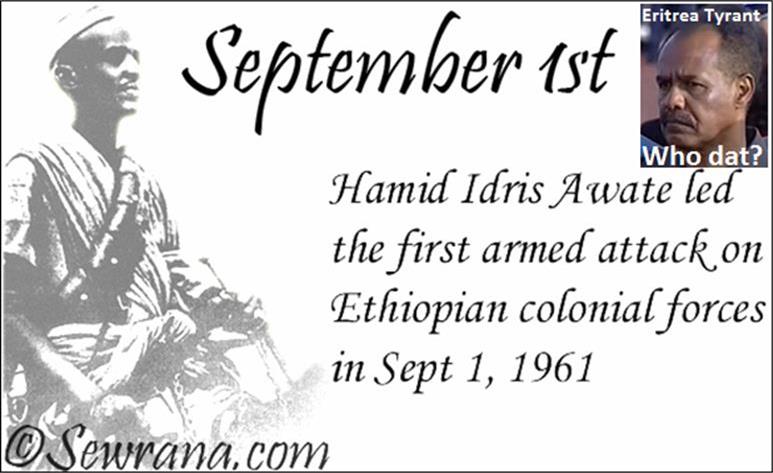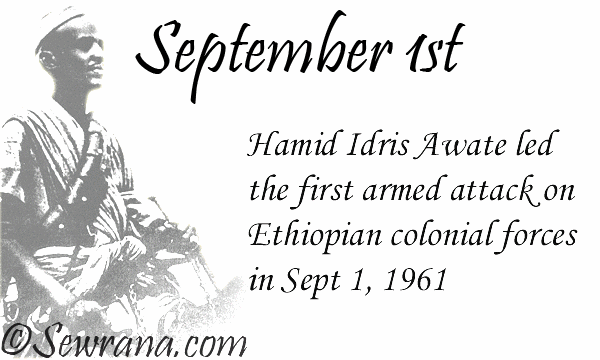September 1: A National Holiday Eritrea Tyrant Wishes Never Were!
01 September 2014
Op-Ed
Eritrea Daily

This is a repost of previous year's op-ed on this occasion because as long as Eritrea tyrant persists, the narrative of 1st September remains the same: This holiday is a day to remember to all Eritreans in eternity except for Eritrea tyrant Isas Afareki who wishes this holiday never were for it doesn't carry the labels 'Isas Afareki' his name and EPLF/PFDJ, the front he represents!
A politically independent and self-governing sovereign nation of Eritrea as we have seen it since May 24, 1991 would never have been realized if it were not for those dozen and half valiant Eritreans under the leadership of valiant Hamid Idris Awate (1911 - 1962) that took it upon themselves and were first to risk life and limb to trigger an all-out armed resistance on 1st September 1961 towards that effect.
It is for that reason that 1st September and hence Awate remains a symbol of Eritrean struggle for independence to date. Awate's persona is deeply embedded in the Eritrean psyche and has become an inextricable part of Eritrea's history. History is cruel for it is indelible. And it is for that Eritrea ruler Afareki had to consent to set 1st September as a national holiday.
In reality, Eritrea tyrant Afareki wishes the national holiday 1st September never were for it would demystify the kind of personality cult they developed around his persona that the people of Eritrea have been duped into believing. For Example, unlike all other national holidays, Afareki does not address the nation on the occasion of 1st September. Afareki does not mention Awate by name at all for reasons obvious to all Eritreans. Unlike other national holidays, Afareki's tyrannical regime does not promote the observance of this one national holiday.
1st September was the only thing that we Eritreans celebrated during the 30-yeat national independence struggle, but following independence hence during Afawerk's reign, 1st September has been reduced to mere observance because the calendar date calls for it.
September 1, 1961signifies the day when the first patriotic Eritreans fired the first bullet that signaled to Ethiopia that its military occupation of our country, Eritrea, will never stand whatever it takes, and to Eritreans, it signaled the beginning of an armed struggle to reverse the military occupation of our country and to bring about our rightful national independence.
September 1, 1961 also known as Bahti Meskerem in local language marks the Day that heralded the absolute determination of the people of Eritrea to wage an armed struggle including whatever other means necessary to re-claim their national independence that has been denied to them 20 years then.
September 1, 1961 marks the spark that galvanized the people of Eritrea to pick up arms to re-claim what has been denied to them forcibly: National Independence.
On this day, September 1 aka Bahti Meskerem, Eritreans commemorate the valor of those who were first to sacrifice their lives towards national independence.
Yes, on this day, Eritreans from all walks of life flocked in droves and an armed liberation front was born.
Whether then those who signaled the beginning of the armed resistance also possessed the necessary military, organizational, or political skills to manage and lead the resulting large resistance army was an issue that was dealt with and resolved, sadly, militarily in later years and has nothing to do with the meaning and significance of Bahti Meskerem. Hence, presence or lack thereof cannot be used to discredit what the actions of Awate and his group attained: They got the armed resistance started at the cost of their own lives, for which they get credit regardless. With all due respect, there was no EPLF in 1961. Hence, speaking truth to power, like it or not, Bahti Meskerem is all about Awate's group and the ELF.
Like all the countries in Africa, Eritrea was first established as a distinct colonial territory (Nation State) as a result of the 19th century colonialists' "Scramble for Africa"; but unlike all such colonial territories, which were disposed of as self-governing and politically independent sovereign States at the end of colonialism, Eritrea was denied national independence for 50 years simply because Eritrea's enviable geopolitical and strategic location was coveted by global forces and Ethiopia's expansionist dreams.
For a small country with a population of barely over 3.5 million, Eritrea's national independence was attained the hardest way and with no precedence or parallel in the annals of colonial history. Our struggle for national independence bears emotional significance that is cumulatively expressed by the following historical dates:
Eritrea's rightful struggle for national independence had a decisive and gutsy beginning (Bahti Meskerem, September 1st, 1961), a happy and victorious ending (Independence Day, May 24, 1991), and tragic human consequences (Martyrs' Day, June 20).
Those three holidays are inextricably bound to each other and cannot be considered in isolation: There is no end without beginning, and there is no gain without pain, as they say! People make history; and those who made history may or may not have perished, but history is cruel and cannot be erased; it will remember them for what they did or didn't do regardless whether others like it or not.
All Eritreans associate themselves with those holidays for they all have participated and contributed to the struggle for our national independence, and no political or non-political group has a proprietary right to those holidays for they involve all Eritreans. Hence, politicizing any of those holidays would be egregious, selfish, and blatant denial of the very Eritrea that we call home today and negation of one's Eritrean-ness because non of those holidays could ever be the cause or contributory to whatever dissatisfaction people may or may not have post independence.
This year, Eritreans celebrate and commemorate the 501st anniversary of Bahti Meskerem or September 1st. After all of 20 years of peaceful means to attain Eritrea's legitimate quest for national independence had failed and faced with the deaf ears of the international community, a group of 15 valiant Eritrean Martyrs under the leadership of the gallant Martyr Hamid Idris Awate risked life and limb and decided to respond forcibly to Ethiopia's military occupation of our country, Eritrea, and engaged them in a battle at a mountainside called Adal (Western Eritrea), where and when the first bullet against the enemy was fired.
The first bullet sent a shock wave to the enemy camp and sparked Eritrea's protracted armed struggle for national right ultimately leading to Eritrea's national independence on May 24, 1991.
Thus, Bahti Meskerem or September 1st constitutes the birthday of Eritrea's armed struggle for national independence. It is the day when Eritrea was conceived to be born on May 24, 1991, when it had to be born. On this day we commemorate, pay tribute, and express gratitude to those valiant Martyrs who were the first to put their life on line for our country's cause. We also celebrate this day because it led to the emergence of a country that we have proudly come to call home today.
Having said that, although all three national holidays enjoy equal holiday status on paper, in practice Bahti Meskerem gets the least attention. Although Bahti Meskerem was the only holiday we commemorated pre-independence, it doesn't get even a fraction of the attention of the week-long preparations, media blitz, and hoopla of Independence Day or the magnificent commemoration of Martyrs Day, not to mention the months long, feel-good, and party-time extravaganza known as Eritrea Festivals?
It appears that Bahti Meskerem is observed merely because it is marked on the holiday calendar, for there is almost no time left to prepare for it since the Festival season extends to/beyond August 31. This is simply not right. Bahti Meskerem must be given equal and due attention like all other national holidays. There must be enough time to prepare for it. It is unfair to squeeze it between couple of days and to subject it to symbolic observance.
For example, although it is a national holiday, there is no mention of those who took the lead in the launching of Eritrea's armed struggle even as a token in the government website (shabait.com) and the official website of the ruling party, PFDJ, shaebia.org, to this very last day of august, yet. Therein lies the suspicion that there is an attempt to belittle the significance of this day for fear that it might undermine/overshadow EPLF's own accomplishments when there is no reason for that?
Bahti Meskerem is an inextricable part of the history of Eritrea. It is not and will not go away and cannot be done away with for history is not forgiving.
The spirit of Bahti Meskerm envisioned an Eritrea of, by, and for all Eritreans, not an Eritrea under the subjugation of totalitarian oligarchy of Isaias Afewerki and the ruling PFDJ that we see today.
In closing, since Independence Day is symbolized by the huge Sandals, would a call to immortalize the spirit of Bahti Meskerem by a statue of the valiant Martyr Hamid Idris Awate in Asmara instead of the meaningless and insignificant statue of some Russian by the name of Alexander Pushkin, a person in whose life time Eritrea never existed, has nothing to do with the struggle of the people of Eritrea for national independence, be asking for too much?
*Long live the spirit of Bahti Meskerem
*Everlasting glory and fame to our valiant Martyrs Hamind Idris Awate and his group
The people of Eritrea will prevail
_________________________________________________________________
Hamid Idris Awate (1911-1962) fired the first shot against Ethiopian government forces on 1961-09-01 at Mount Adal. He went on to create the Eritrean Liberation Army (the armed wing of the Eritrean Liberation Front. He died in June 1962 from natural causes. The name Awate means victory in the Tigre language. He was a father of two daughters and a son, Karrar Awate.

|
|